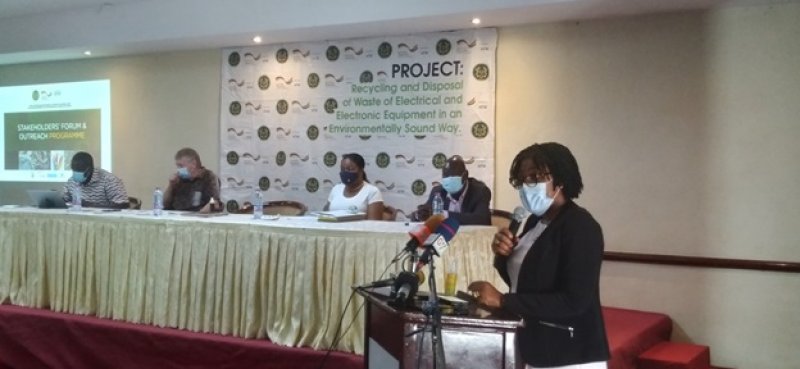The Ministry of Environment, Science, Technology and Innovation has engaged key stakeholders within the electronic waste (e-waste) value chain on the implementation of a project aimed at managing the disposal of e-waste in a sound environment in Kumasi.
The project, which is also seeking to minimize negative environmental and human health impacts from improper management of e-waste, is a collaboration between the Ministry and the German Government through KFW.
Representatives from scrap dealers associations, electronic repairers, environmental health officers, waste management companies, and the Environmental Protection Agency (EPA) attended the forum.
It was to raise awareness of the project and to get the concerns of the participants to help inform policy and project implementation.
Under the 20-million Euro project, which started in 2018, the German government is supporting Ghana to set up an incentive mechanism for the sound collection, dismantling, recycling, and disposal of e-waste.
Consequently, a Handover Centre has been established in Accra to purchase e-waste from scrap collectors at a fee slightly above the market value as an incentive to halt the burning of e-waste to obtain copper.
The Chief Director of the Ministry, Mrs. Cynthia Asare Bediako, in a speech read on her behalf, said the project was modeled to align with provisions of Act 917 and provided the government the opportunity of identifying challenges and lessons learnt to improve upon national systems once it fully took off.
According to her, over 50 tonnes of e-waste cables were purchased by the Handover Centre at Agbogloshie since the incentive payment system was launched in June, last year.
“The project hopes by mid-April 2021, to commence the purchase of mixed batteries at Agbogbloshie. These e-waste fractions when collected will be offloaded to licensed recycling companies to handle them in an environmentally sound manner”, she stated.
She said it was important to sensitize all stakeholders on the Regulatory Framework on e-waste management in Ghana and outline the roles each of them could play for a successful implementation of the project.
The Director, Policy Planning, Monitoring and Evaluation, and the Project Coordinator, Mrs. Lydia Essuah, said Ghana’s e-waste management was largely controlled by the informal sector with close to 97 percent dominance.
She said they employed crude, rude and unconventional methods to recover the valuable component and indiscriminately disposed of the hazardous component at the detriment of the environment and human health.
The current system, she said, was not sustainable and that was why the government has taken steps including policy direction, legislation, business models, and funding to address the problem.
Latest Stories
-
Gideon Boako donates 10 industrial sewing machines to Yamfo Technical Institute
41 seconds -
‘Golden Boy’ Abdul Karim Razak honored at WAFU-B general assembly
15 mins -
Buipewura Jinapor secures Vice Presidential position in National House of Chiefs with record votes
24 mins -
2024 election: I want results to come out like ‘milk and honey’ – Toobu
25 mins -
Ghana’s Henry Bukari hands over chairmanship of ECOWAS Brown Card Council of Bureaux
31 mins -
Residents of Dome-Kwabenya on edge ahead of December elections
1 hour -
Moffy drops new single ‘Wo’, blending culture and modernity
1 hour -
Don’t bring soldiers to polling stations – Martin Kpebu
1 hour -
Ogyeahohuo Yaw Gyebi II retained as President of National House of Chiefs
2 hours -
Embrace ICT to fit in digital world – Ho NYA boss to youth
2 hours -
We don’t want armed soldiers at polling stations – Tanko-Computer
2 hours -
Drama as police corner armed robbers inside locked forex bureau at Lapaz
3 hours -
NEIP CEO to Kwaku Manu: You can support any political party, but stop misbehaving in NPP colours
3 hours -
30% quota for less privileged shows Free SHS is inclusive – Ofosu Nkansah
3 hours -
Nigerian-born conquers childhood hearing loss to become KNUST’s overall best graduating student
3 hours

